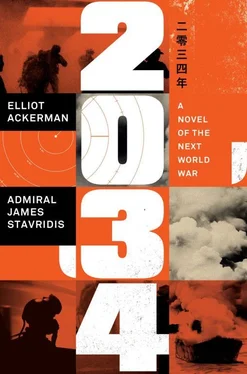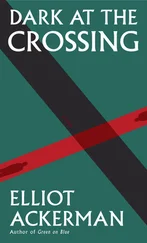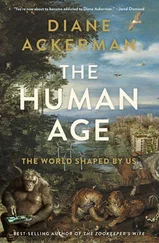Wedge made his orbit around the city and prepared to meet the pilots somewhere along that path. They would come at each other like jousting horsemen of another era—lances down, forward in their saddles, the issue decided in a blink. Events were playing out in seconds and in fractions of seconds. This is it , Wedge thought—the it he’d been chasing for the entirety of his life. He was ready. His thoughts returned to his family, to that lineage of pilots from whom he’d descended. He could feel his father, his grandfather, and his great-grandfather, their presence so close it was as if they were flying off his wing. A certainty possessed him: the advantage in numbers wasn’t with the two assholes in the Sukhois but with him, Wedge.
Odds are four to two, motherfuckers, he thought—and almost said it aloud.
He locked onto the first Sukhoi, releasing a sidewinder from his wingtip, while simultaneously firing an exhalation’s worth of rounds from his cannon. The Sukhoi did the exact same to him, so that their air-to-air missiles passed one another in mid-flight. However, the first Sukhoi had made a mistake. When Wedge diverted toward the second aircraft, so, too, had the sidewinder fired by the first. Wedge was out of chaff and flares to confuse the sidewinder, but if he could bring it in close enough to the second Sukhoi, that might disorient it.
The second Sukhoi observed the threat of the incoming sidewinder.
From its fuselage, it deployed chaff and flare.
Wedge could see the sidewinder spiraling toward him as he rushed closer to the second Sukhoi, like a three-way game of chicken. Then the sidewinder dipped on its axis, following a burning piece of chaff. Simultaneously, both Wedge and the second Sukhoi released bursts from their cannon. When the two passed one another, there was a sound like a limb snapping off a tree….
…Blue sky everywhere, it turns to black, then rushes back to blue.
The wind on Wedge’s face.
When he bolted awake, the stick had flopped out of his right hand. Wedge grabbed it, snatching back control of his Hornet. Checking his instruments, he hadn’t lost much altitude. He couldn’t have been unconscious for long, maybe a second, like an extended blink. A puddle was growing beneath his legs. He touched his right thigh and could feel a protrusion. A piece of steel—likely from the fuselage—had embedded below his hip. Two thumb-sized holes—around thirty millimeters, a little larger than his own cannon—had pierced the front-left and back-right of his cockpit, hence the wind on his face.
He glanced behind him, to where the second Sukhoi would’ve passed. He found it easily, a brackish trail of smoke heaving from one of its engines. In the same direction, a little farther on, an oil-black smoke cloud lingered in the otherwise perfectly clear sky. This could only be one thing—the other Sukhoi. His sidewinder must have found its mark. He’d tallied his first-ever air-to-air victory. He felt dizzy, which might have been loss of blood and might have been his body’s response to the thrill of this achievement.
Wedge now needed to climb to ten thousand feet. He still had his payload to deliver. Then he would figure out how to get home, or at least how to get far enough out to sea to bail out. Slowly, he climbed. His left rudder was shot out, making the plane skittish in its ascent and hard to control. Neither of his engines were at thrust capacity; the pair of them were bleeding fuel. Whatever damage he’d done to the second Sukhoi, it had done about the same to him. And as he climbed, that stubborn second pilot slotted in behind him, giving a limp chase.
Won’t matter, concluded Wedge. He was already past eight thousand feet.
He glanced down at the city spread before him. Little pits of light appeared in his vision. He tried to blink them away. Then a vertiginous darkness crept inward from his periphery as though he might black out again. The puddle he sat in kept deepening. When he looked at his altimeter, it was blurry too, but it soon read ten thousand feet. Wedge went through the arming sequence. His hands felt as though he wore several sets of gloves as he clumsily toggled through the switches and buttons and lined up his aircraft into its angle of attack. The Sukhoi was behind him, but he had thirty seconds, maybe more, until he’d need to deal with that.
A lot was going to happen in those seconds.
Everything was set. Wedge’s finger hovered over the button. Whatever wooziness or confusion he’d felt moments before had yielded to a perfect clarity.
He hit the release.
Nothing.
He hit it again.
And again.
Still, nothing. And now the Sukhoi was coming up to altitude, notching in behind him. Wedge struck the controls in his cockpit in frustration. He recalled the tenth Hornet in their squadron, the one that’d gone down in training days before. He thought they’d fixed this problem with the release mechanism. Apparently not.
Didn’t matter. He had a job to do.
Wedge pushed the stick forward, angling into a dive. The payload was going through its arming sequence, and if it was stuck on his wing he’d take it in himself. The Sukhoi didn’t follow but instead broke away, understanding the maneuver and evidently wanting no part of it. Not that it would’ve made a difference. The Sukhoi wouldn’t be able to put enough distance between itself and what was to come.
A sensation of weightlessness overtook Wedge as he dove.
The details below—buildings, cars, individual trees, and even individuals—were filling in fast. This business, war, the business of his family and of his country—he’d always accepted that it was a dirty business. He thought of his father and his grandfather—the only family he had—hearing the news of what he’d done. He thought of his great-grandfather, who’d flown with Pappy Boyington. And, strangely, he thought of Pappy and the old stories of him staring out through his canopy, scanning the horizon for Japanese fighters, a cigarette dangling from his lip before he’d toss it into the vastness of the Pacific.
The city was rushing up toward Wedge.
He’d told Admiral Hunt that he didn’t do suicide missions. Yet this didn’t feel like a suicide. It felt necessary. Like an act of creative destruction. He felt like he was the end of something and in being the end he would achieve a beginning.
Wind from the broken canopy was on his face.
At five hundred feet, he remembered the pack of celebratory Marlboros he’d tucked into his flight suit, in the left chest pocket. Though it was futile, he reached for them. This was his last gesture. His hand placed over his heart.

19:19 July 30, 2034 (GMT+8)
Beijing
Three more men from internal security waited in the lobby of the Four Seasons Hotel. They stepped onto the elevator with Lin Bao. Not a single introduction, no one speaking. His escort, the dark-suited man who’d taken him from the ministry, had the number of the suite where Zhao Leji and other key members of the Politburo were clandestinely meeting to discuss the appropriate strategic response to the sinking of the Zheng He .
Lin Bao had ideas as to what that response could be. He chose to focus on those ideas as opposed to why they were meeting at the Four Seasons and not some more secure location, or why they’d stepped out of the elevator on only the fifth floor and were now walking down a corridor with closely spaced rooms as opposed to suites. India’s involvement might prove a positive development, if leveraged correctly. An Indian intervention would make it so that the strikes against Galveston and San Diego would be the last of the war. If his country struck the final blow, they could make the argument—at least to their own people—that they had been the victors. And they could avoid what at this moment seemed like an inevitable counterstrike against another of their major cities—Tianjin, Beijing, or even Shanghai.
Читать дальше













